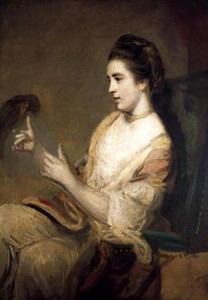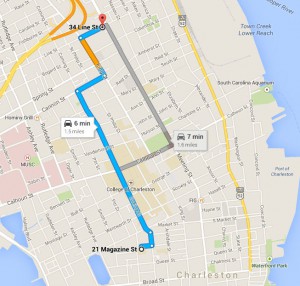Most people who are interested in hunting ghosts have heard of Lavinia Fisher, her alleged criminal exploits as an innkeeper near the city of Charleston, SC, her tumultuous execution, and her haunting of the Old Charleston Jail. But in case you haven’t, we will present the legend as it is typically told on true crime blogs, ghost hunting shows, and ghost tours. Then we’ll try to set the record straight.
The Legend
Lavinia Fisher was America’s first female serial killer and the first woman executed in America. She, along with her husband John, were arrested, tried and convicted of mass murder and hanged at the Old Charleston Jail. Wearing her wedding dress (and a noose), she shouted, “If any of you have a message for the devil, say it now for I shall see him in a moment” and flung herself off the platform before the hangman could perform the duties for which he would be paid in alcohol.
Lavinia and John were innkeepers who drugged their patrons with a special tea (rumored to be oleander) and secreted them down into their cellar via hidden trapdoors in the bedrooms to murder them (the number of victims varies). One man, John Peebles (or Peoples), a weary traveler looking for a bed for the night, was almost a victim.
After sharing a late dinner with the Fishers, Mr Peebles retired to his room and a short time later Lavinia brought him some of her “special” tea to help him sleep. He did not like tea, but he probably did not want to offend his host so he dumped it out of the window when she was not looking. Mr. Peebles was concerned about personal questions the Fishers had asked during dinner and it occurred to him that he might have said too much and they might attempt to rob him, so instead of going to bed he decided to wait out the night sitting in a chair. A little while later, he was stunned to see his bed disappear. Mr. Peebles escaped out the same window and ran to the police to make a report. The sheriff hastened to the inn and during the investigation found a cellar with hidden tunnels full of the personal belongings of people reported missing and approximately 100 skeletons.
The Fishers were tried in May of 1819, convicted of murder and sentenced to hang. They were housed in the jail until they were hanged in February of 1820 and buried in the Unitarian Church Cemetery in Charleston.
It is reported that Lavina is one nasty spirit who not only haunts the Old Charleston Jail, but attacks people as well.
The Truth

Alleged Portrait of Lavinia
Only three facts in that tale that are actually true. There are no genealogy records for the family of Lavinia, but we can use records from John, newspapers of the time, and court documents found in the state archives to set this story straight.
Because we know Lavinia’s reported age at the time of her death, we can say she was born sometime in 1792-93. This is a close to any “fact” about her vital records as we can come. There are no birth or marriage records for her and John. We have no way of knowing what her maiden name was or where she was born. All we really know about her is that in 1819 she and her husband were innkeepers at an establishment outside of the city of Charleston and that they had no living children.
In January and February of 1819 the area around Charleston was riddled with highway robbers, but the victims could never identify their attackers. A group of men from the city decided these robbers were staying at local inns and they formed a mob to drive them away.
On February 16, 1819, the vigilantes set upon Five Mile Inn and told the group there that they had to vacate the property. When the group refused to leave, the mob burned the inn to the ground. They then proceeded to the Six Mile Inn, operated by John and Lavinia Fisher. The vigilantes gave the same commands and the group there decided it would be best if they vacated the building. The mob left a man named David Ross at the inn to keep watch, and this is where things start to go south for the Fishers.
According to an affidavit sworn to by Mr. Ross, several guests came back to the inn, got physical with him, then kicked him out of the house. Mr. Ross went back in again to get his belongings and Lavinia proceeded to choke him and put his head through a window. Two other men, William Heyward and John Fisher, beat him with loaded whips. Mr. Ross managed to escape up the road and missed the bullets being fired in his direction.
A few hours after Mr. Ross escaped, a man named John Peoples stopped to water his horse at the Six Mile Inn. According to his sworn account, he was beaten and robbed by the ten people there before he too managed to escape back to town.
After a judge received these two affidavits, the sheriff, accompanied by a large group of men, proceeded to the Six Mile Inn, subsequently arrested the five remaining occupants and sent them to the city jail in the paddy wagon. The sheriff conducted an investigation of the property and found the remains of a dead cow (which a neighbor had recently reported stolen). After the investigation was completed, the inn with all its contents and all buildings on the property were burned to the ground.
That last sentence is important to the story.
About a week later the coroner went to the property because someone reported a “fresh grave.” He did indeed find one and in that grave were two bodies. One was a man who had been shot and had died about eight days earlier. The other was a black woman who had been buried about two years prior. It is supposed the man was part of one of the previous raids and had been buried in the grave of a slave that had been hastily dug open. In the years since, this property was been dug up for construction and these are the only two bodies ever found.
The Fishers and William Heyward were indicted for “assault with intent to murder” against David Ross on May 10, 1819. On May 27 they were found guilty and on June 2 they were sentenced to hang. They appealed their case and were bound over to the gaol, as it was known then, until January when the appeals court would be in session.
On January 17, 1820, John and Lavinia had their day in court and something puzzling happened. The Charleston Courier reported that not only had their appeal for a new trial been denied, but they had now been convicted of highway robbery against John Peoples and sentenced to hang. Yes, you read that right: their conviction changed from assault against David Ross to highway robbery against John Peoples. John and Lavinia Fisher were hanged for a crime for which they had never been tried and convicted.
On February 18, 1820, Lavinia — who even at this time thought she was going to receive a pardon because surely they would not hang a white woman — and John put the white gowns known as “garments of the condemned” over their own clothes, were loaded in a wagon and taken away from the jail to the hanging site on Meeting Street Road, with Lavinia fighting every step of the way.
As reported in the Charleston newspaper, the place of the hanging was “at the lines on Meeting Street Road.” This was around the area of present day Line Street, which as you can see by this map, is over a mile from the jail.
Once on the gallows, no matter how much comforting John tried to do, an extremely agitated Lavinia responded to Rev. Galluchat’s call for repentance with the words that would cement her place in Charlestonian history: “ Cease, I will have none of it. Save your words for others that want them. But if you have a message you want to send to Hell give it to me; I’ll carry it.”
When the sheriff assured her no pardon was coming, Lavinia cried out to God in panic and eventually made her peace. John addressed the crowd, asking forgiveness from those he had wronged and forgave his accusers. Finally, he once again proclaimed his and his wife’s innocence.
A letter was then read to the crowd:
Rev. and Dear sir – The appointed day has arrived – the moment soon to come, which will finish my earthly career; and it behooves me, for the last time, to address you and the Rev. Gentlemen associated in your pious care.
For your exertions in explaining the mysteries of our Holy Religion, and the merits of our dear Redeemer; for pious sympathy, and benevolent regards as concerns our immortal souls, accept Sir, for yourself, and them, the last benediction of the unfortunate – God, in his infinite mercy, reward you all.
In a few moments, and the world to me shall have passed away – before the Throne of the Eternal Majesty of Heaven I must stand – shall then, at this dreadful hour, my confused, agitated lips, still proclaim a falsehood? No! then by that Awful Majesty I swear, I am innocent.
May the Redeemer of the world plead for those who have sworn away my life.
To the unfortunate, the voice of condolence is sweet – the language of commiseration delightful – these feelings I have experienced in the society of Mr. ________; a stranger, he rejected not our prayer; unknown, he shut not his ear to our supplication; he has alleviated our sorrows- May God bless him. He has wept with us – May Angels rejoice with him at a Throne of Glory.
Enclosed, Sir, is a key that secretes my little all – Give it to him and say for me, as he deserted me not while living, I hope he will discharge my last request. How my property is to be disposed of, he will find explained in a paper within my trunk, to which is attached a Schedule of the whole. I only wish him to see it removed to a place of safety, until to whom it is given shall call for it. The hour is come!
Farewell, Sir, Farewell:
JOHN FISHER
At a little past 2 o’clock in the afternoon, with their nooses around their necks, John and Lavinia hugged each other for the last time. Caps were then placed over their faces and the hangman released the trapdoor.
Lavinia died instantly without a sound, but it took John several minutes. Their bodies were left hanging for the time required and then removed from the area and buried in Potter’s Field.
If I have not lost your interest, you will remember that I said the popular story had only three valid facts in it. Those facts are: John and Lavinia were innkeepers, they were sentenced to hang, and Lavinia did say words that she probably wished she hadn’t.
Let’s look at other parts of the legend.
Lavinia was American’s first serial killer and the first woman executed in America. Since Lavinia did not murder anyone she is hardly a serial killer and she was not the first woman executed. That claim to fame belongs to a woman named Jane Champion, who was hanged for an unknown charge in 1632. If not knowing the charge makes you want to discount her, that’s okay. There are 35 other women you can choose from who were executed before Lavinia was.
Lavinia and John were never convicted of murdering anyone, much less a hundred people. When they were hanged it was not at the jail and it was while wearing the traditional hanging outfit, not her wedding dress. Their home was burned to the ground with all their belongings almost as soon as they were arrested, how could she have been wearing her wedding dress?
John Peoples was not a guest at the inn, he was a man who had stopped to water his horse and was robbed in the process.
Yes, Lavinia had an outburst, but she died having made her peace with her fate and with God and was buried in a pauper’s cemetery, not in consecrated ground.
Today, we have no way of knowing where Lavinia and John are. Potter’s Field ceased to exist in 1825 and there is no way to know if their bodies were ever dug up and relocated, or if they were just covered up with buildings for the arsenal, military school, or medical university.
We know from the application for the national historic register that Potter’s Field was located on Ashely Street. In 1825 it became the Federal Arsenal, in 1880 the Porter Military School, and in the 1960s it became the Medical University of South Carolina.
A gentleman by the name of Bruce Orr recently wrote a book, Six Miles to Charleston, and it seems that his research mirrors a lot of my own, but he did come up with one very interesting fact that I missed, and I have to admit that I am jealous he found this bread trail. You can read the book to get all the details, but suffice it to say that Lavinia’s statement about “not hanging a white woman” is curious in light of this new possible lead.
John’s uncle paid $700 for two female slaves, one who had the very unusual name of Lavinia. Did John and slave Lavinia fall in love, move to the low country and present themselves as man and wife? Witness statements describe John’s wife as “darker.” Did this mean she was a tan woman or maybe not 100% white?
These actual facts are things that investigators need to keep in mind when they pay their fee to investigate at the Old Charleston Jail. Maybe, just maybe, if you are sympathetic to her, you might have better results and less hostility in your investigation.
Does Lavinia haunt the gaol that was her home for the better part of a year as an intelligent spirit? If she does, could it be that her anger and resentment are because of all the untruths being told about her? This woman was denied justice and hanged for a crime for which she was not even tried, let alone convicted. In modern times she has been accused of being a witch and in league with the devil. She may not have been the most upstanding of women, but did she deserve her fate?
I know all this malfeasance and perfidy would all probably turn me into a vengeful spirit – how about you?













Share This
Share this post with your friends!